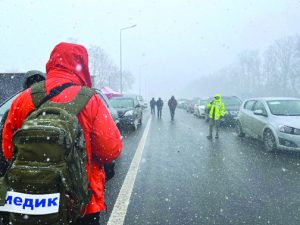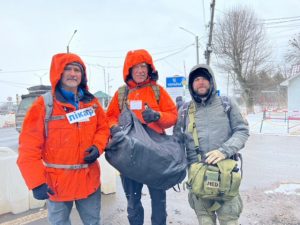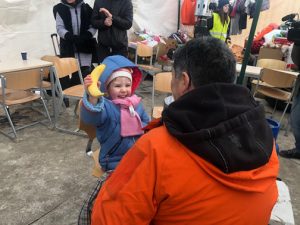
Photos provided by Dr. John RODARTE
It is a disquieting fact that we tend to find villains more interesting than their victims – in fiction and in reality – but the Nuremberg Trials revealed that in real life criminals and murderers are invariably colorless individuals who lack personality as well as compassion and conscience. It is their victims who frequently display courage and endurance beyond normal human experience.
~Paul Roland author, “The Nuremberg Trials: the Nazis and Their Crimes Against Humanity”
By Mary O’KEEFE
The world is watching as Russian President Vladimir Putin’s forces invade Ukraine, continuing their murder of civilians and their destruction of an entire country. There are theories as to why Putin is doing this, from well-thought-out factually-based reasons to conspiracies that seem to be so prevalent in today’s society. In the end, though, there is no reasoning behind mass murder and crimes against humanity.
Two local residents who are used to rescuing those in need have just returned from Ukraine, where they went to help where they could.
The outreach to Ukraine started with a conversation between Montrose Search and Rescue member Mike Leum and Jack Osbourne, a civilian volunteer and an EMT – and the son of entertainer Ozzy Osbourne.

Osbourne has gone out with MSAR on numerous occasions and he and Leum have become friends.
“[Osbourne] is a member of our [LASD] department, a volunteer with the sheriff’s department,” Leum said. “A few weeks ago [after the invasion of Ukraine] we were just talking about how we can help.”
Osbourne had a connection with a non-governmental organization called Third Wave Volunteers that was responding to Ukraine. They also learned there were orphans who were having problems coming across the border.
Osbourne called Leum and said there are three spots open to travel to Ukraine; he and Leum took two and then they invited Dr. John Rodarte, a pediatrician and member of MSAR, to join them.
Rodarte has gone on several missions to many countries, including Africa and Mexico, as medical support. He was able to arrange his patient schedule so he could accompany Osbourne and Leum and they were off.
“The problem is, being in a war zone, there are a lot of things that change minute to minute, and our mission changed by the hour,” Leum said.
They found that most of the orphans didn’t have their paperwork completed, even though there were families in the United States who were working toward adopting them prior to the invasion.
Leum admitted it sounded odd to have to get completed paperwork in order to save children but there was a lot of human trafficking in the area and protecting children – not just from the bombs but also from predators – is a priority.
“You can’t just shop for a kid,” he said. “We were told that the human trafficking is just rampant. Guys would pull up in vans to groups of kids and say ‘Jump in’ and the kids were not heard from again.”
So the main mission of getting the orphans across the border became even more problematic. The team decided to do what they could to establish a safe path for the children and for future rescue volunteers.
“The [paperwork] issue caused our entire mission to pivot toward humanitarian efforts,” Leum said.
They were staying just 30 minutes from the border of Ukraine and each day they traveled across the boarder to help where they could.
For Dr. Rodarte, the trip was something he had never experienced before. In past trips he went to help with medical aid. He dealt with a known issue; but, he said, on this trip the issues changed.
“Every minute things would change, especially in terms of trying to get the orphans out through a safe corridor. Those doors would open and close within minutes,” he said. “Just as soon as you think you are going to get the kids out, that door would close.”
In many areas where Rodarte travels there is a known illness. Oftentimes he and his team are dealing with people who struggling with severe poverty or lack of medical help. They have lived with these conditions their whole life and it is a known issue; however, the Ukrainians lived a life similar to many Americans. They had good medical care, went to school, shopped for the latest fashions and went to the theater. And then everything changed.
“They were more shell shocked,” he said of their condition.
It was more of a psychological assault and not just when they crossed the border; the repercussions might last for years to come.
“This is going to affect all of their lives forever, this whole generation,” Rodarte said.
Both Leum and Rodarte shared stories of seeing women cross the border with their children in tow, many carrying one suitcase and a child’s backpack. They left everything behind, including their family who stayed to fight the Russians.
Adopting more of a humanitarian posture meant many times just talking to those crossing the border. Rodarte focused on the children. He had met a teenage girl and her young brothers who had left their older brother behind to fight.
“There was a 10-year-old boy. His mom was sitting and crying; she had just said goodbye to her husband [who went back to fight]. The 10-year-old boy was patting his mom’s shoulder saying, ‘It will be okay,’” Rodarte said.
The boy had taken on the role of “head of the family.”
Leum added that, over and over again, he would see the strength of the Ukrainian people, from the fathers and brothers walking their families to the border and then saying goodbye to the moms and children going forward, doing what they had to do to stay safe.
Leum and Rodarte also spoke of the “bone chilling” cold and snowstorms that would stop traffic at the border.
“What will stick with me forever is the resolve of the Ukrainian people. They are leaving everything they have behind, including husbands and brothers,” Leum said. “You could just see in their faces that this is the way it is and we are going to forge ahead.”
He said the kids were respectful and dealing with this tragedy with such strength.
Rodarte said he spent time playing LEGOS or video games with some kids and joked around with one little girl to try to get her to smile.

“Just letting them be kids for a little while,” he said.
Toward the end of their time in Ukraine they were able to help set up a safe path for the orphans and are getting updates that kids are now moving across the border.
Leum and Rodarte thanked those in the community who kept prayer circles going for their safe return. Leum added he thinks he will return to help again; Rodarte does not know if he can leave his patients again but both are fully invested in the struggle for Ukraine.
Leum added that upon his return he has a new perspective on life in America.
“The thing that you thought was a problem [here in America] – it’s not a problem. We may have inconveniences but there are not bombs dropping on us and our families are not being torn apart by war,” he said. “The other thing that sticks with me is the complete respect and appreciation for the Ukrainian people for what they are going through. The complete resolve they have and the dedication they have to their country and to each other is admirable.”
